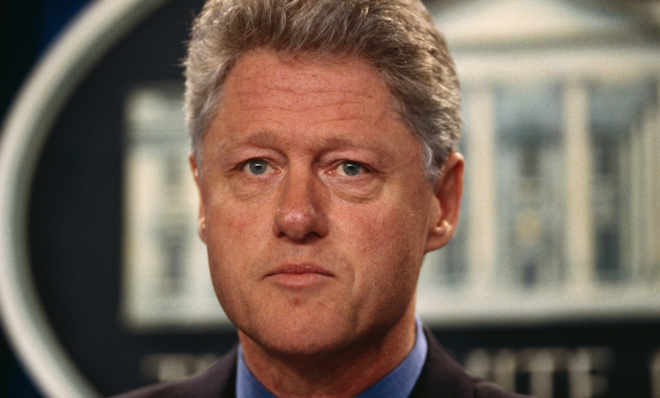Today in history: October 8
In 1998, the House of Representatives voted to move ahead with impeachment proceedings against President Clinton

A free daily email with the biggest news stories of the day – and the best features from TheWeek.com
You are now subscribed
Your newsletter sign-up was successful

Oct. 7, 1869: Franklin Pierce died. He was the 14th president, serving between 1853 and 1857. "Baby" Pierce, as he was called because he was 49 when he became president, is the only POTUS from New Hampshire. Pierce, regarded as one of the worst presidents for his failure to stop the United States from sliding into Civil War, suffered politically after he backed repeal of the Missouri Compromise on slavery. The Missouri Compromise was an 1820 agreement between pro- and anti-slavery factions in Congress. It banned slavery in the former Louisiana Territory north of the 36th parallel except within the boundaries of the proposed state of Missouri.
Oct. 7, 1888: President Grover Cleveland signed the Chinese Exclusion Act, which restricted Chinese immigration to the U.S. Cleveland wanted immigrants who would adopt American culture and assimilate; he had no interest in those who he believed would not.
Oct. 7, 1998: The House of Representatives voted to move ahead with impeachment proceedings against President Clinton. Clinton was subsequently charged with perjury and obstruction of justice. He was impeached by the House, but acquitted by the Senate.
The Week
Escape your echo chamber. Get the facts behind the news, plus analysis from multiple perspectives.

Sign up for The Week's Free Newsletters
From our morning news briefing to a weekly Good News Newsletter, get the best of The Week delivered directly to your inbox.
From our morning news briefing to a weekly Good News Newsletter, get the best of The Week delivered directly to your inbox.
The House decision to impeach came after a four-year investigation into Clinton and his wife Hillary's alleged involvement in an assortment of real estate, fundraising, and sexual harassment scandals. During this investigation, an independent prosecutor, Kenneth Starr, learned of an affair between Clinton and a White House intern, Monica Lewinsky. The president had denied the affair as part of another lawsuit (the Paula Jones case), but when questioned by Starr, Clinton tried to invoke executive privilege to avoid responding. Starr then charged the president with obstruction of justice, forcing the president to testify before a grand jury in August 1998.
In his testimony, Mr. Clinton acknowledged that he had an "inappropriate" relationship with Lewinsky. But he insisted that his testimony had been "legally accurate." When addressing the investigation into his past business dealings, Clinton insisted the investigation did not prove that he or his wife Hilary had engaged in any illegal activity.
After this testimony, the House voted to impeach the president in December 1998. He was acquitted, though, after a five-week trial in the Senate. Public opinion polls showed that many people disapproved of the Lewinsky affair, but didn't think it justified impeachment or resignation.
Clinton was the first president to be impeached by the House of Representatives since Andrew Johnson in 1868. Johnson was also acquitted.
A free daily email with the biggest news stories of the day – and the best features from TheWeek.com
Quote of the Day
"Every immigrant who comes here should be required within five years to learn English or leave the country." -Theodore Roosevelt
More from the West Wing Reports...
-
 James Van Der Beek obituary: fresh-faced Dawson’s Creek star
James Van Der Beek obituary: fresh-faced Dawson’s Creek starIn The Spotlight Van Der Beek fronted one of the most successful teen dramas of the 90s – but his Dawson fame proved a double-edged sword
-
 Is Andrew’s arrest the end for the monarchy?
Is Andrew’s arrest the end for the monarchy?Today's Big Question The King has distanced the Royal Family from his disgraced brother but a ‘fit of revolutionary disgust’ could still wipe them out
-
 Quiz of The Week: 14 – 20 February
Quiz of The Week: 14 – 20 FebruaryQuiz Have you been paying attention to The Week’s news?